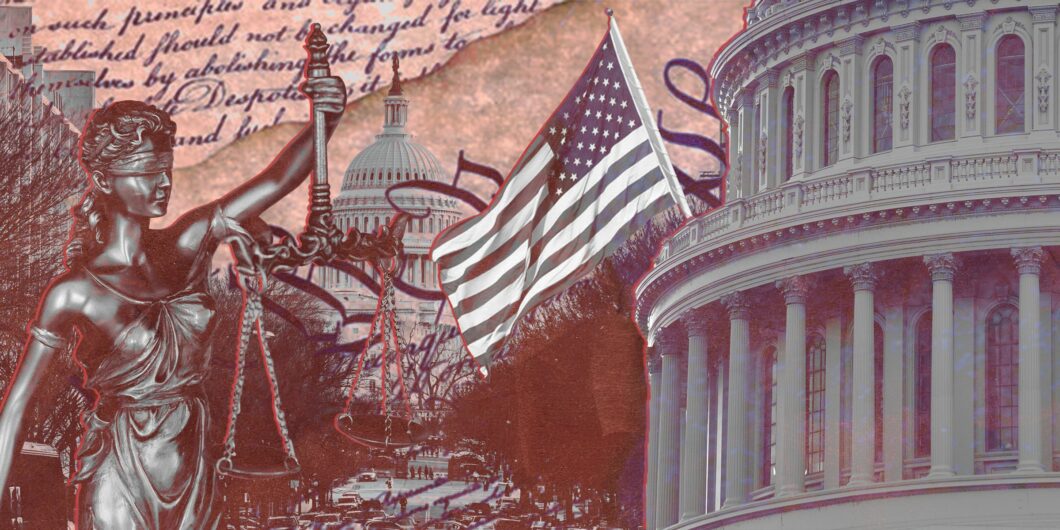Union or Empire?
It is easy to agree with Yuval Levin, as on many other points, that our American Constitution is not the problem. But by itself, it cannot provide the national unity Levin discusses.
In the divide between pro-constitutionalists and anti-constitutionalists, Levin identifies the James Madison view of government and the Woodrow Wilson view. But a path forward to compromise between the two does not exist. One must submit to the other. And as I see it, the Wilsonians are a multitude, while the Madisonians are currently few in Washington.
What divided Madison and Wilson’s approach to the federal government is not a matter of separate paths reaching the same goal, but a completely different set of objectives. Madison held the ideals of representative democracy and open debate between competing interests as government’s primary ends in themselves. Wilson, on the other hand, was a progressive theorist who viewed government as a means in the perpetual crusade for social change.
The subtext of the debate Levin outlines is what makes it complicated. Some Americans want to abide by our nation’s charter and use its institutions as intended, while some see them in a fundamentally different light. How can two walk together unless they are agreed? How can a stalemate be broken, a peace be reached, and combatants stand down when the two stand in existential disagreement over their intentions?
Madison and the founding fathers, primarily our Patriæ Pater, George Washington, expressed their intent for America to be a nation of united states primarily by their concern for self-government, that is, governing of ourselves, by ourselves, for ourselves. Our capital city was founded to honor our noble Father not only in his name, but also in the customs he encouraged us to practice. Washington wanted the capital to be a forum of exchange, compromise, and agreement all conducive to the common benefit. Its neutral location, its name, and its very construction were deliberately designed for this purpose.
The interests that are meant to compete in this grand civil arena of Washington are interests of ever smaller, more local circles of society. A family, community, county, and state all should have levels of representation for their subgroup interests—and by gathering all such interests together in the federal government, the interests of all could have a voice. But this does not imply that the federal government is the ultimate authority for these subgroups. Families have their proper authority—a father and mother—while towns have city halls, counties have statehouses, and states have the national capitol. These layered rings of authority stabilize the American republic and protect our way of life. Even more importantly, the layers permit non-political interests like love, faith, and honor to be naturally expressed.
In the widest ring, compromise is only possible when each institution maintains its own ring. The smaller the ring, the stricter the rule of law must be. A mother can hardly be called a “dictator” or considered authoritarian for giving her children medical treatment based upon what she observes and understands concerning their health, but a national dictate from the capital city mandating all mothers to submit their children to medical treatment regardless of their individual circumstance would rightly be called illiberal and authoritarian, just as a small group attempting to seize power in the national capitol would be a coup.
Even if Wilson is not correct that everyone must share the same political philosophy or social views, they must at least share a common desire to make the constitutional system work.
The Wilsonian view of America and its practice in the federal government, however, has pushed us towards treating America not as a national republic of free and equal countrymen arriving at solutions through compromise, but as a totalizing empire, only with no emperor to invoke his ancient privilege and divine majesty to settle disputes. It is no wonder that Americans see the only ring worth fighting for as being the largest and outermost—the “Emperor’s Ring” that contains the only institutions that matter. Only when a complete takeover of these institutions is complete will they hope to secure their local interests.
In such a strategy, one must use the national government to override and undermine the sovereignty of the smaller, more local rings within society. Its proponents view the region, the county, the city, the church, the family, and the man, as incapable of self-government. Government is the purview of experts on bureaucracy and governance, not of the average people who are being governed.
This pattern of usurpation, which is increasing in its urgency and velocity, has led many to see America as less a union of states and more of an empire, with the states being subordinate to the Imperial District’s graces, commands, and administration.
President Wilson perhaps trusted in the character and intentions of the professionals of his day too much, not foreseeing how those of less noble character and ill intent could pervert such powerful engines of the administrative state. And he definitely trusted too little in the abilities and virtues of the average self-governing American. His presidency is the story of a massive expansion of the federal government, but perhaps more important than the size is the scope of its authority—its place in society that should have been constitutionally bounded.
It may be that Wilson was partially correct in arguing that, as Levin summarizes it, “the parts of a system of government (and indeed the various institutions of a society) had to all work together, guided by the same vision and pulling in the same direction.” Even if Wilson is not correct that everyone must share the same political philosophy or social views, they must at least share a common desire to make the constitutional system work, to turn the federal government into a neutral forum of discussion rather than a bludgeon of ideology. Madison did not lack beliefs about the best outcomes, but he prioritized the process over the outcomes—trusting that even a second-rate outcome arrived at fairly and inclusively was better than forcing one point of view. Wilson, on the other hand, placed little value on discussion and prioritized efficient administration of his presupposed view.
Today, there is no common Madisonian desire to make a constitutional system work, nor is there Wilsonian agreement over what the system should accomplish. Decreasing numbers of citizens prioritize ideals like procedural norms and political magnanimity over the accomplishment of even short-term objectives, but the objectives differ from citizen to citizen. On the left, this is a result of crisis propaganda—racism, climate, gender and sexual identities, and global democracy. Under the imperatives of this rhetoric, everything must change now or all is lost. On the right, there is a growing acceptance of the idea that the left has accrued a monopoly on power, and only extreme measures, setting aside restraints and self-imposed limitations, can break that monopoly.
If there is common agreement on anything, it is between the left and right in their belief that we need regime change now. Since Plato’s Republic, this necessity has been understood as part of a cycle of regimes—an oligarchic or administrative class arises, and only the centralization of power in a sovereign, along with a temporary de-constitutionalization, can restore justice and popular sovereignty. The Founders recognized this necessity as well, and arguably employed it as justification for their American Revolution—with an elite group of subversive insurgents standing in for the sovereign, writing new laws, and waging war unilaterally. In our day, this move is embodied by elements on the right who seek to empower the executive or the judiciary to rein in the power of the administrative class, thus allowing Congress to fulfill its purpose.
Whether or not these are wise moves, we must recognize that they are historically precedented and inexorable ones. Calling for the left and right to simply recommit to the Constitution is similar to calling on two nations engaged in warfare to cease fire and disarm. As America slips further into the form of an Empire, most politically minded Americans will eventually recognize the urgent necessity of contending for control of the Emperor’s Ring: the imperial city and its institutions. Once it is captured, both sides should hope that the captor will magnanimously reopen it as a forum for constitutional debate.


